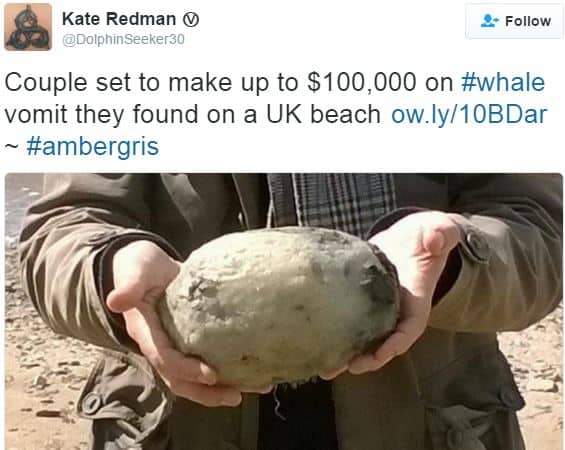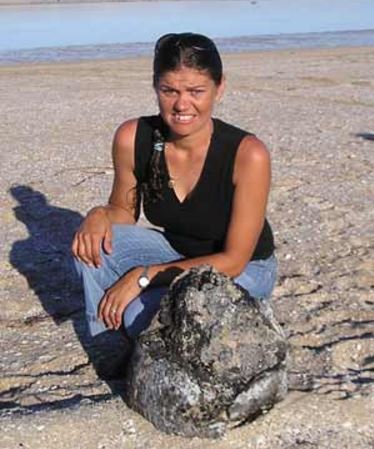If you are walking down the beach and see a piece of whale vomit, pick it up, because the perfume industry might pay you up to £50,000 ($70,000 or €63,000) for it, and perhaps a lot more if it is a big one. The whale vomit that looks like an unusual waxy rock is called amgergris.
On Sunday, Gary and Angela Williams were walking along the Middleton Sands beach near Morecambe Bay, a large estuary in northwest England, just to the south of the Lake District National Park, when they saw a weird-looking lump that smelled of rotting fish.
Mr. Williams, who said they had been walking down a section of the beach very few people go to, described their discovery as a ‘bit of a shock’.
 There is a lot of talk in social networking websites about there being ‘gold in the sea’. However, the chances of finding whale vomit (ambergris) are so tiny that becoming an ambergris-fortune-hunter is definitely not the path to riches. (Image: twitter.com/DolphinSeeker30)
There is a lot of talk in social networking websites about there being ‘gold in the sea’. However, the chances of finding whale vomit (ambergris) are so tiny that becoming an ambergris-fortune-hunter is definitely not the path to riches. (Image: twitter.com/DolphinSeeker30)
Regarding its peculiar aroma, Mr. Williams added:
“It smells too bad though. It’s a very distinctive smell, like a cross between squid and farmyard manure. It feels like a rock hard rubber ball. Its texture is like wax, like a candle. When you touch it you get wax sticking to your fingers.”
Ambergris – excreted by sperm whales
Ambergris is a solid, waxy, dull grey or blackish flammable substance produced in the digestive system of sperm whales – a bile duct secretion of the intestines. It can be found lying on the coast or floating upon the sea.
When freshly produced it has a marine faecal smell (like the poo of a marine creature). After a while it acquires a sweet, earthy scent, a bit like the fragrance of rubbing alcohol, but without the vaporous chemical astringency.
It used to be very highly valued by the perfume industry as a fixative – a substance that makes the scent last much longer. Although it has been largely replaced by synthetic ambroxan, the industry will still pay a good price for natural ambergris.
Scientists say that ambergris is usually passed in the faecal matter. However, if it is too large to pass through the intestines, they believe it is expelled via the mouth, hence its reputation as whale vomit.
 This lucky lady found a large, 15kg ambergris on a beach in South Australia in 2011. Even though she was thrilled at the US$300,000 valuation, from the look on her face she was not all that happy about sitting so near to it. (Image: laputanlogic.com)
This lucky lady found a large, 15kg ambergris on a beach in South Australia in 2011. Even though she was thrilled at the US$300,000 valuation, from the look on her face she was not all that happy about sitting so near to it. (Image: laputanlogic.com)
Ambergris is only produced by sperm whales, and only about 1% of them, experts say. Once the whale expels it, it must float on the sea for several years, and then make landfall without being broken up into pieces – just in case you are considering going out in search of one. The odds of finding ambergris are extremely remote.
In other words, anybody out there thinking of making their fortune by searching for and selling ambergris will be in for a huge disappointment.
Mr. and Mrs. Williams are currently negotiating with possible buyers from France and New Zealand, and expect to get a good price for their surprising find – perhaps £50,000.
Mr. Williams says the money will go a long way towards buying a static caravan. “It would be a dream come true,” he said.
Video – Whale vomit found on Morecambe Beach
Three years ago a man walking with his dog became curious when his pet showed unusual interest in a rock. He picked it up and noticed the foul smell. It was a piece of whale vomit (ambergris). It seems the North West of England is the place for ‘sea gold’ luck!

